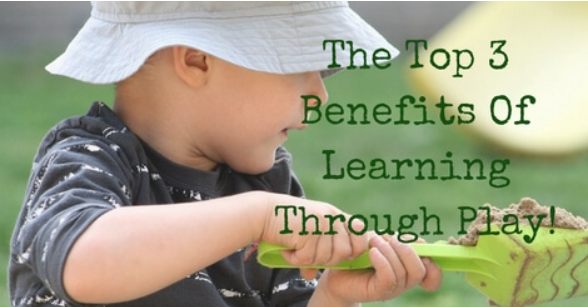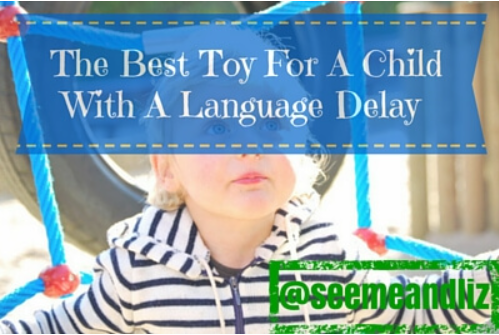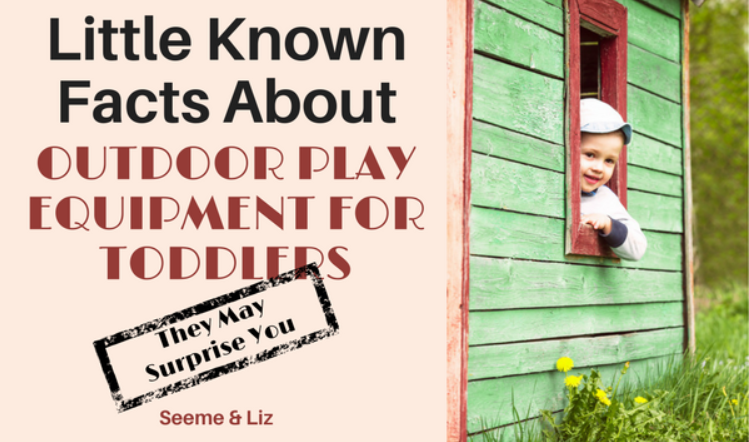As a strong supporter of children learning through play, I want to share with you the Top 3 Benefits of learning through play.
What child doesn’t want to play “grocery store” or “rocket to the moon”?
These were some of the pretend play scenarios I loved playing as a child and now I’ve had the privilege of watching my own kids do the same.
On the surface, play is very simple and many people have a hard time seeing it more as something kids do to keep themselves entertained.
But play is so much more than simply a way to pass the time.
In fact, there are many stages that a child goes through with regards to pretend play.
For example, an 18 month old will pretend to feed a doll or cover a teddy bear with a blanket so the bear can go to sleep.
However, a 5 year old might come up with an elaborate scenario involving setting up chairs and pretending it is an airplane.
My kids love turning the dining room into an airport and the kitchen into the plane. They even make tickets which each passenger has to hand in at the gate (aka, the kitchen counter).
Each stage of play a child goes through will aid in their development.
Top 3 Benefits of Learning Through Play
♦ Play Encourages Communication
Play allows children the opportunity to develop speech and language skills as well listening skills.
Children talk and listen while they play.
Whether this be during solitary play which typically involves self talk and narration (e.g. “now my car is driving up the hill and then it goes down, wee, wee, wee”), guided play or play with a peer, children communicate to add purpose to their play.
The more vocabulary a child is exposed to on a day to day basis, the greater the variety of words a child will incorporate into play.
I love seeing and hearing some of the scenarios my children come up with.
For example, they love playing restaurant.
They have to decide who will be the cook and who will be the server.
My daughter is the older one so she usually writes out the menu, but they both decide what will be included on the menu (usually milk, juice, coffee, hot dogs, sushi, spaghetti and ice cream – quite the combination).
And they always make sure that we pay for our food.
Sometimes there are disagreements about who gets to play which role, or what will be included on the menu.
If they can’t sort it out themselves I will step in and help them work through these issues and we also talk about compromising.
♦ Play Improves Cognitive Development
Children who engage in pretend play tend to have more sophisticated levels of interaction with others.
Bergen, D (2002) found that more and more evidence supports the connections between cognitive ability and high quality pretend play.
Moreover, if children are deprived of play, their long-term capabilities related to problem solving, social skills and academic areas (e.g. literacy, math and science) could be lessened.
The complexity of these skills demonstrate that many areas of the brain are most likely involved.
For more information please see the complete study by Bergen.
Additional research about the benefits of learning through play shows that:
♥ Children whose fathers played with them had greater levels of imagination and cognitive ability than those whose dads did not play with them.
♥ Children who played with their parents also participated in other activities, had positive mental health, stronger friendships and experienced a stronger family bond when compared to those whose parent’s did not play with their children as much.
♥ Children whose mothers played with them showed a greater level of attachment to their moms and enjoyed more positive development compared to children whose mothers did not play with them regularly.
It is important for parents to get involved with their child’s play, especially when they are still young (birth to 4).
As your child gets older, make sure to step back and let them do their own thing, there is plenty for them to learn without you hovering and “teaching”.
♦ Play Facilitates Relationship Building
Play helps to promote the development of social skills.
Children who play with their peers (and parents) learn how relationships work through their play experiences.
As play becomes more important in a child’s life, an increase in the number and quality of their friendships can be seen.
Many people don’t realize that social skills are a vital part of language development.
Language is so much more than simply spoken words!
The Many Benefits Of Play!
These are my top 3 benefits of learning through play.
There are definitely many more than these and I could go on and on about this topic.
If you are interested in reading about the role of play in normal emotional development please read the article “Free Play Is Essential for Normal Emotional Development” found in Psychology Today.
Share some of your children’s favorite pretend play activities in the comments below!





